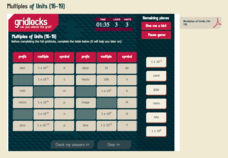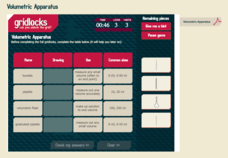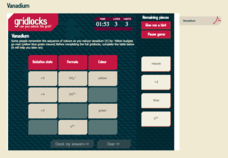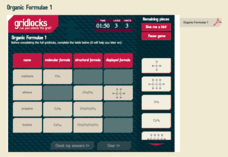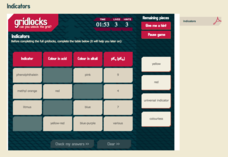EngageNY
TASC Transition Curriculum: Workshop 15
What do a cheetah, Audi commercial, and air have in common? They're all topics of an engaging inquiry-based, hands-on workshop for educators about background knowledge, reading strategies, the CER model, and argumentative writing. The...
Royal Society of Chemistry
Multiples of Units (16-19)
It's a parade of prefixes! Chemistry scholars identify common prefixes used throughout the sciences using an interactive puzzle series. Learners solve puzzles by pairing the prefixes with the power of ten they represent.
Royal Society of Chemistry
Volumetric Apparatus
Can your class tell the difference between a burette and a pipette? Develop their lab apparatus knowledge using a series of puzzles. The online activity associates the name, image, and sizes of burettes, pipettes, volumetric flasks, and...
Royal Society of Chemistry
Vanadium
Introduce your chemistry scholars to the periodic table's Goddess of Beauty! Through an interactive that highlights the transition metal vanadium, learners discover the colors produced in solution as vanadium changes oxidation state....
Royal Society of Chemistry
Symbols
Chemistry calculations can look a bit like alphabet soup at times. How do you help pupils make sense of it all? An interactive resource helps scholars sort through the symbols for common quantities such as moles, boiling point, and...
Royal Society of Chemistry
Sub-shells
Is your class in a quandary over quantum numbers? Change things up by adding games to the mix! Science scholars discover the shape, number of electrons, and number of orbitals in the s, p, and d sub-shells using an interactive.
Royal Society of Chemistry
Some A-level Reagents
Learning names and formulas can be a daunting task for young chemists, so support their study with interactive puzzles! First, users match each formula with its correct name. Then, individuals use them to complete three logic games.
Royal Society of Chemistry
Significant Figures
Ready to add some innovation to your significant figures lesson? Pupils practice sig fig rules using a puzzle approach. Check out the Teacher's Area for printable materials, an answer key, and strategies for implementing the resource.
Royal Society of Chemistry
Shapes of Molecules—Hybrid Orbitals
Take your chemistry class' knowledge of molecular geometry to the next level! Introduce orbital hybridization with a series of related games. Individuals complete a data table in the first activity, then solve Sudoku-like puzzles using...
Royal Society of Chemistry
Shapes of Molecules—Distortion from the Pure Geometry
Ready to introduce the realities of molecular geometry to chemistry pupils? Use a logic-based interactive! Perfect as individual practice, the puzzles explore the bond angles and repulsions present in three common molecular shapes.
Royal Society of Chemistry
pH 4: Activity
Sometimes playing games in class isn't a bad thing. Science sleuths evaluate and calculate pH and pOH with an online resource. They then manipulate concentration information and relate it during a series of puzzles.
Royal Society of Chemistry
pH and pOH
Feeling a little neutral about your pH and pOH teaching strategy? Perk it up with engaging puzzles! Young scientists relate ion concentration to pH and pOH, as well as the dissociation constant for water. The resource is available as an...
Royal Society of Chemistry
pH 2: Activity
Pupils puzzled over pH? Incorporate an interactive resource that teaches through games! Chemistry scholars use reasoning to solve puzzles that focus on determining the pH based upon hydrogen ion concentration.
Royal Society of Chemistry
Organic Formulae 2
Is your chemistry class frustrated by the multitude of representations of organic molecules? Add some challenging puzzles to an otherwise ho-hum organic lesson and let the fun begin! The second of a two-part activity focused on basic...
Royal Society of Chemistry
Organic Formulae 1
Puzzles are the formula for success in organic chemistry! Hydrocarbons abound in the first of two interactives involving basic organic molecules. The easy-to-use lesson is available online and in print form, so you can pick your delivery...
Royal Society of Chemistry
Mass Concentration of Solutions
Ready to teach your class about molar mass and solution concentration? Make time for an interactive resource that will challenge their reasoning and problem-solving skills. Science scholars calculate the molarity of several solutions...
Royal Society of Chemistry
Indicators
How do chemists know what indicator solution is the perfect match for the acid or base they're studying? Discover a rainbow of indicator-related properties with an Internet resource. Individuals relate the indicator solution to its...
Royal Society of Chemistry
Gas Laws: Converting Units
Given a choice between playing a game or completing a worksheet, which do you think your class would choose? Tap into their reasoning skills with a series of puzzles focused on gas laws unit conversion. You can use the resource online or...
Royal Society of Chemistry
Electronegativity Values
Finally, an electronegativity resource your class will be strangely drawn to! Skilled scientists manipulate interactive puzzles to gain an understanding of common electronegativity values. The great thing? You can conduct the lesson...
Royal Society of Chemistry
Concentration of Solutions 1
Need a fun solution to teaching ... solutions? A series of puzzles provides reinforcement to key molarity terms and calculations. Science scholars determine the concentration of several solutions before using the information to solve...
Royal Society of Chemistry
Complex Ion Shapes
Things are really shaping up! Provide young chemists with polyatomic ion practice using an interesting interactive. Individuals complete puzzles focused on molecular geometry and complex ions.
Royal Society of Chemistry
Shapes of Molecules—Geometry of Central Atom
How is a molecule's shape determined? Explore bond angles, lone pairs, and VSEPR theory through a logic-based activity. Chemists pull together information about the major molecular shapes, then use it to solve puzzles.
Royal Society of Chemistry
Organic Names—Functional Groups
Worried that your lesson plan about functional groups is dysfunctional? Liven things up with interactive puzzles! Curious chemists arrange functional groups based on name, formula, suffix, and an example. The challenge begins when the...
Royal Society of Chemistry
Naming Esters
Do your chemistry scholars know their esters? Introduce the class to the nomenclature and structural formulas of common esters through thought-provoking games. Individuals or pairs of pupils match the name with the formula before using...



